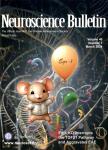Distinct Roles of Dopamine Receptors in the Lateral Thalamus in a Rat Model of Decisional Impulsivity
Distinct Roles of Dopamine Receptors in the Lateral Thalamus in a Rat Model of Decisional Impulsivity作者机构:Neuroscience Research InstitutePeking UniversityBeijing 100191China Department of NeurobiologySchool of Basic Medical SciencesPeking UniversityBeijing 100191China Key Laboratory of NeuroscienceThe Ministry of Educationand Ministry of Public HealthBeijing 100191China Division of Nuclear Technology and ApplicationsInstituteof High Energy PhysicsChinese Academy of SciencesBeijing 100049China
出 版 物:《Neuroscience Bulletin》 (神经科学通报(英文版))
年 卷 期:2017年第33卷第4期
页 面:413-422页
核心收录:
学科分类:0710[理学-生物学] 07[理学] 071006[理学-神经生物学]
基 金:supported by the National Natural Science Foundation(81471353) the National Basic Research Program of China(2015CB553500) the Science Fund for Creative Research Groups from of National Natural Science Foundation of China(81521063)
主 题:Lateral thalamus Decisional impulsivity D1 receptor D2 receptor
摘 要:The thalamus and central dopamine signaling have been shown to play important roles in high-level cognitive processes including impulsivity. However, little is known about the role of dopamine receptors in the thalamus in decisional impulsivity. In the present study,rats were tested using a delay discounting task and divided into three groups: high impulsivity(HI), medium impulsivity(MI), and low impulsivity(LI). Subsequent in vivo voxel-based magnetic resonance imaging revealed that the HI rats displayed a markedly reduced density of gray matter in the lateral thalamus compared with the LI rats. In the MI rats, the dopamine D1 receptor antagonist SCH23390 or the D2 receptor antagonist eticlopride was microinjected into the lateral thalamus. SCH23390 significantly decreased their choice of a large, delayed reward and increased their omission of lever presses. In contrast,eticlopride increased the choice of a large, delayed reward but had no effect on the omissions. Together, our results indicate that the lateral thalamus is involved in decisional impulsivity, and dopamine D1 and D2 receptors in the lateral thalamus have distinct effects on decisional impulsive behaviors in rats. These results provide a new insightinto the dopamine signaling in the lateral thalamus in decisional impulsivity.



